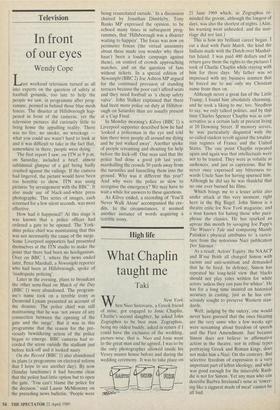High life
What Chaplin taught me
Taki
hen Nico Sistovaris, a Greek friend of mine, got engaged to Josie Chaplin, Charlie's second daughter, he asked John Zographos to be best man. Zographos, being my oldest buddy, asked in return if I could have the exclusive of the wedding, picture-wise, that is. Nico and Josie went to the great man and he agreed. I was to be the only photographer allow6d inside his Vevey manor house before and during the wedding ceremony. It was to take place on 21 June 1969 which, as Zographos re- minded the groom, although the longest of days, was also the shortest of nights. (Alas, his warning went unheeded, and the mar- riage did not last.)
This is how my brilliant career began. I cut a deal with Paris Match, the kind the Indians made with the Dutch over Manhat- tan Island. I was paid 400 dollars and in return gave them the rights to the pictures I took of Charlie Chaplin while staying with him for three days. My father was so impressed with my business acumen that he forced me to use only my Christian name from then on.
Although never a great fan of the Little Tramp, I found him absolutely charming, and he took a liking to me, too. Needless to say, we only talked politics, and by that time Charles Spencer Chaplin was as con- servative as a certain lady at present living at 10 Downing Street. If memory serves, he was particularly disgusted with the so-called student revolt against the totalita- rian regimes of France and the United States. The one point Chaplin repeated again and again was that intellectuals were not to be trusted. They were as volatile as audiences, and just as capricious. But he never once expressed any bitterness to- wards Uncle Sam for having spurned him. Although he did say he was thankful that no one ever burned his films.
Which brings me to a lesser artist also under attack at this very moment, right here in the Big Bagel. John Simon is a theatre critic for New York magazine, and a man known for hating those who para- phrase the classics. He has sparked an uproar this month by savaging Joe Papp's The Winter's Tale and comparing Mandy Patinkin's physical attributes to 'a carica- ture from the notorious Nazi publication Der Stiirmer.'
As a result, Actors' Equity, the NAACP and B'nai Brith all charged Simon with racism and anti-semitism and demanded that he be fired. In defence, Simon has repeated his long-held view that blacks should not play roles written for white actors 'unless they can pass for whites'. He has for a long time insisted on historical accuracy in casting, just as he has con- sciously sought to preserve Western stan- dards.
Well, judging by the outcry, one would never have guessed that the ones bleating are the very same who a few weeks ago were screaming about freedom of speech and the First Amendment. Just because Simon does not believe in affirmative action in the theatre, nor in ethnic types portraying Greek and Roman kings, does not make him a Nazi. On the contrary. But selective freedom of expression is a very important part of leftist ideology, and what was good enough for the miserable Rush- die is not for Simon. Yet any, man who can describe Barbra Streisand's nose as 'tower- ing like a ziggurat made of meat' cannot be all bad.


































































 Previous page
Previous page